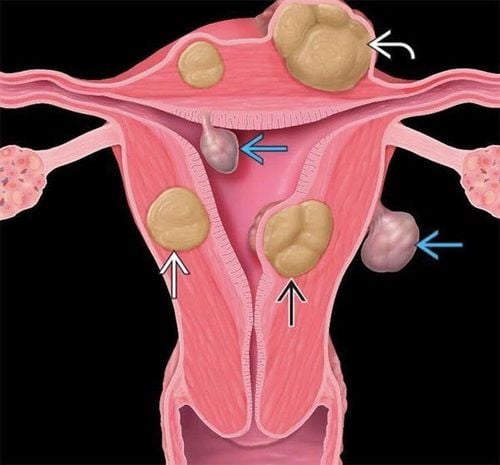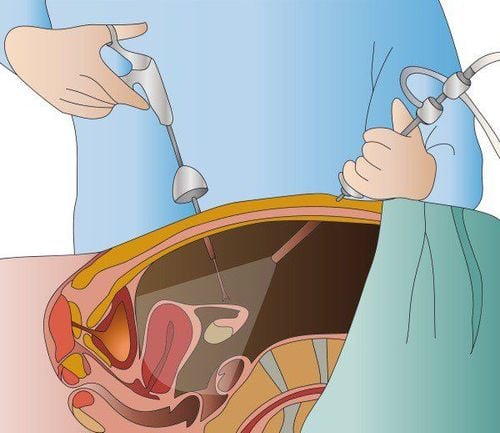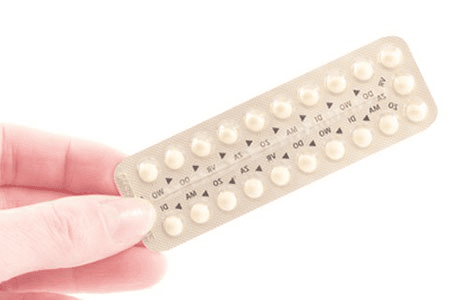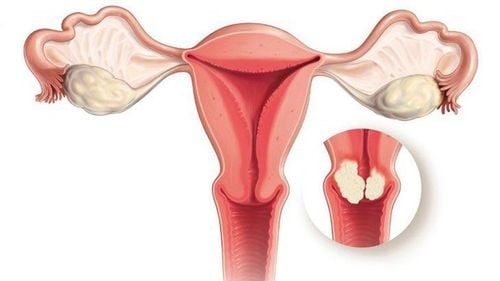This is an automatically translated article.
The article was professionally consulted by Doctor Nguyen Chi Quang, Department of Obstetrics and Gynecology - Vinmec Central Park International General Hospital.Uterine fibroids are often discovered during routine medical check-ups. Patients can also self-examine and detect uterine fibroids when lying on their back, palpate the tumor emerging under the skin of the abdomen, if it is lightly pressed, it will feel pain to prevent complications and be treated early.
1, What causes uterine fibroids?
Many studies have shown that the cause of uterine fibroids is due to high levels of estrogen in the body and strong activity leading to increased muscle tissue and uterine lining. Therefore, fibroids can shrink and atrophy when a woman has reached menopause.Some documents suggest that uterine fibroids are related to reproductive health: multiple miscarriages, infertility, infertility, women with few births... are also at risk of causing uterine fibroids. However, the disease still occurs in women who have given birth to many children. In some pregnant cases, uterine fibroids can lead to a number of risks such as abnormal fetal position, premature birth, placenta attached in an abnormal position (placenta previa, placenta previa... ). It can be seen that uterine fibroids affect motherhood, health and quality of life of women.
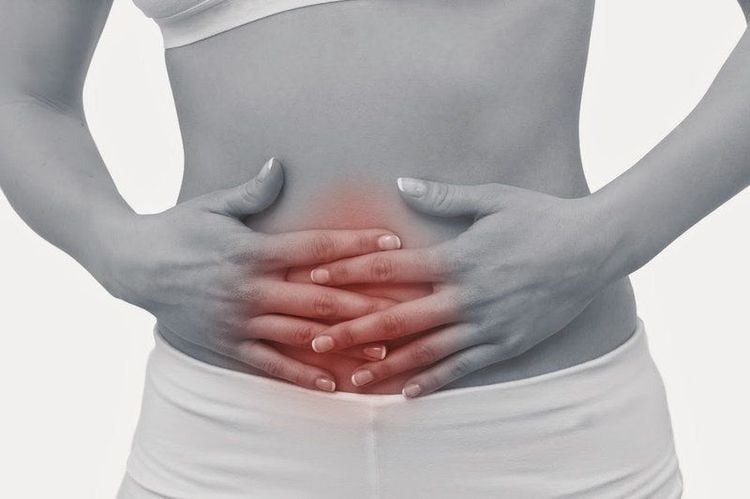
U xơ tử cung ảnh hưởng đến thiên chức làm mẹ, sức khỏe và chất lượng sống của phụ nữ
2, Manifestations of uterine fibroids
Most patients go to the doctor when they find themselves having menstrual disorders, get married but never have children. Or the patient has feelings such as: heaviness in the abdomen, abdominal pain, pain in the lower abdomen or pelvis.In some other cases, when the tumor forms large, it can press on nearby organs, on the bladder causing frequent urination or urinary retention, on the rectum causing constipation or pain when defecating, on the intestines, stomach leading to digestive disorders.
In case the patient is found to have fibroids during pregnancy, fibroids may cause a number of complications: the tumor will shed the placenta prematurely, causing the fetus to lack blood supply, shifting its position. of the fetus, making it difficult for the mother to give birth naturally but to have a caesarean section. Most cases of uterine fibroids during pregnancy still have normal fetal development. However, tumors will grow faster during pregnancy.
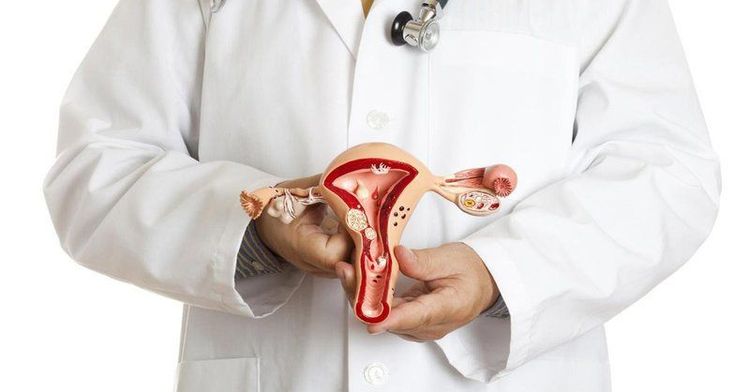
Các khối u sẽ lớn hơn trong lúc mang thai
3, When is the patient indicated for surgery for uterine fibroids?
Not all cases of uterine fibroids require surgery. Because, for small, uncomplicated tumors, the patient only needs to go to the doctor once every 3 months. Or you may be prescribed medication to help regulate the menstrual cycle. The goal of using drugs is not to completely get rid of the fibroids, but the substances contained in the medicine will help shrink the fibroids.Treatment with surgical methods is considered as a radical treatment, especially in the following cases:
The patient has menstrual disorders, menorrhagia, heavy bleeding, and hypermenorrhoea causing anemia, muscle the body was thin, pale and medical treatment was no longer effective After some tests, the doctor found a fibroid with a peduncle or a twisted stalk Noticed the tumor was growing abnormally fast and suspected it was cancer Uterine fibroids develop after menopause. Large uterine fibroids compress, causing uterine malformations or hindering the ability to get pregnant (causing miscarriage, premature birth, fetal malformation). Large tumor compresses other organs, causing patients to urinate or defecate a lot because fibroids press on the bladder, ureters or intestines Large fibroids are equivalent to a uterus about 12 weeks pregnant. Submucosal fibroids or within the broad ligament When cancer is suspected.
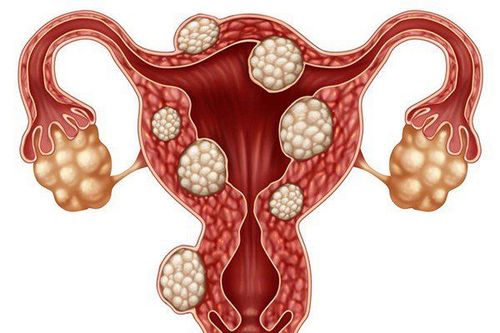
Bệnh nhân sẽ được chỉ định phẫu thuật khi nghi ngờ ung thư hóa
With the development of science and technology in modern medicine, there are many techniques applied in uterine fibroid surgery such as: open surgery, conventional laparoscopic surgery and robotic laparoscopic surgery. And now robotic surgery is a preeminent method, bringing many benefits to patients in the treatment of uterine fibroids: accurate in each operation; eliminate unnecessary vibrations because the robot has 4 hands, equivalent to 2 surgeons; capable of operating in difficult positions because it can move freely at 6 angles; safe, uncomplicated, no surgical infection; Less blood loss helps the patient recover quickly.
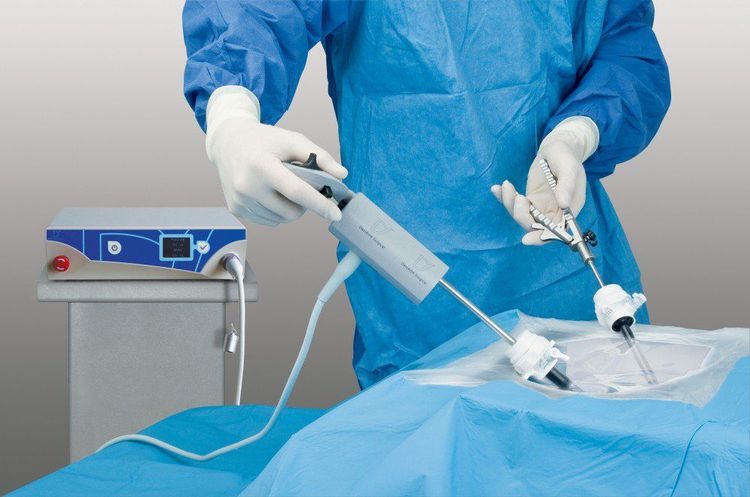
Phẫu thuật ít xâm lấn bằng robot cánh tay
From September 2019, Vinmec Central Park General Hospital (HCMC) deploys a new technique - Robotic surgery with hand-held robots, applied to digestive and endocrine surgeries. urology and gynecology.
This method has many advantages compared to both classical laparoscopic surgery and robotic surgery with:
Instruments with surgical heads that work as flexibly as wrist joints to help access narrow angles, increasing the possibility of dissection. separates and causes less damage to the surrounding areas compared to classical laparoscopic surgery Endoscopes are automated through voice, laser, eye tracking,..., helping the doctor to actively control and have vision Better visibility and control, increased accuracy and safety in surgery With the advantage of compact, robotic arm surgery is less invasive and has many advantages such as small incision, less pain, risk low infection, thereby helping customers less blood loss during surgery, quick recovery The cost of implementation is much lower than robotic surgery.
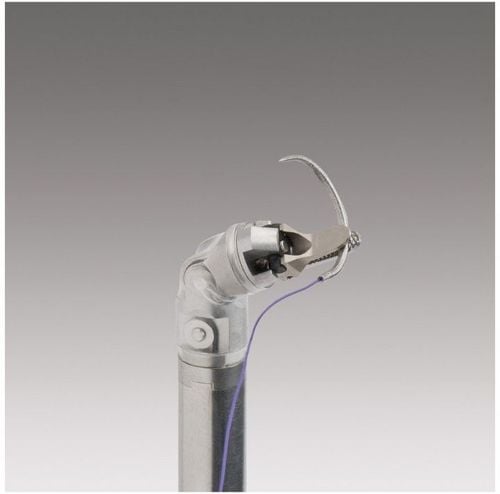
Với ưu điểm nhỏ gọn, phẫu thuật bằng cánh tay robot ít xâm lấn và có nhiều lợi điểm như đường mổ nhỏ, ít đau, nguy cơ nhiễm trùng thấp
Customers will be operated by Doctor Nguyen Chi Quang - Department of Obstetrics and Gynecology - Vinmec Central Park International General Hospital. Before becoming a Doctor of Obstetrics and Gynecology at Vinmec Central Park, Dr. Nguyen Chi Quang used to work at Tu Du Hospital and University of Medicine and Pharmacy Hospital in Ho Chi Minh City. Dr. Quang has many years of deep professional experience and strength in the treatment of obstetric and gynecological diseases such as:
Laparoscopic surgery Uterine fibroids Laparoscopic surgery for ovarian tumors Laparoscopic surgery for genital prolapse For more information about the Gynecological Surgery promotion program and to book an appointment for examination and treatment at Central Park International General Hospital, please contact Hotline: 0283 6221 166 or register online HERE .





